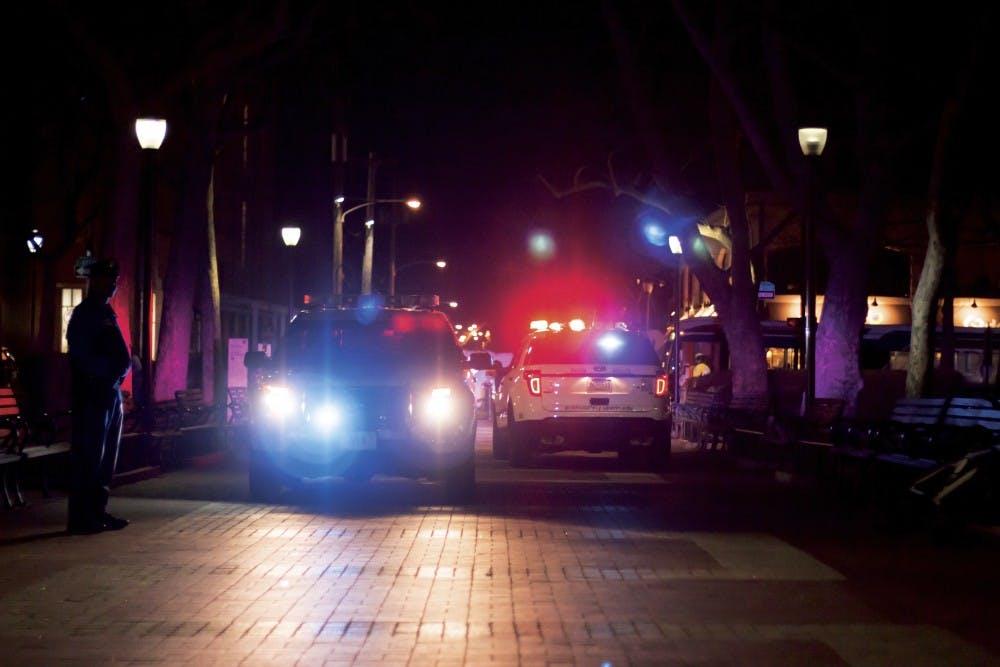
The Friday following the massacre of Jews at a Pittsburgh synagogue, I received an email from Rabbi Micah Shapiro explaining that, per the University's recommendation, Penn Hillel will be increasing its security. An increased security presence comes with a slew of heavy baggage, and some students are at much greater risk of shouldering this stress. The earthquake of fear that this massacre sent through the United States and all Jewish communities was visceral and sickening.
I don’t think I’m pointing out anything new when I say that spaces of worship should be safe from violence. Couple this given sentiment with the fact that an increased police presence could make students of color feel uncomfortable and what we have is a wound that bleeds into all facets of our lives. This wound needs cauterizing. The way to do this is with stricter gun laws.
Penn Hillel has been forced to teeter on a shaking tightrope with no net to catch it. Increased police presence seems to me a solution squeezed from an administration placed between a rock and a hard place, but this doesn’t discount how it might make some students feel. How do we negotiate between the different answers to feeling safe? How do we recognize the need for increased police presence while grappling with the message this sends the community? Though Penn’s campus can feel isolated from some of the greater horrors of the world, racial profiling doesn’t magically dissolve once you step on Locust Walk. More so, how do we as a community recognize that the immediate answer of greater police presence could alienate some students during an already tumultuous time? The better and more difficult solution is to abolish the threat at the nexus of this fear.
Hillel now requires students to show their PennCards at the front entrance, in addition to increased patrols in the surrounding area by the Penn Police. An Allied Universal security officer was already stationed at the front desk, but the added officer and Penn ID requirement will be new additions.
We shouldn’t need to be protected when praying, but the decision to increase security at Penn Hillel highlights how fear has surpassed what should and should not be done. A man who has blatantly blasted hatred online should not have access to weapons that result in the slaughter of innocent people, and the president of the United States should not blame a synagogue for not having better security. But what should we do in response?

File Photo
I’m not criticizing the decision to implement stricter security protocols at Penn Hillel, and I’m certainly not alone in my criticisms of the chain of events that resulted in these policies. It’s a sad fact that practicing your religion in a place of worship has become an act people are scared to perform. But it shouldn’t be. The implication that worship is something that requires protection sends the wrong message to both parties. I shouldn’t be scared to pray, and others shouldn’t be scared that I pray.
Stricter gun control is necessary if we want to alleviate the problem Penn Hillel — and synagogues across the country — is facing. When more severe security is needed, yet the demographics of any population have varying opinions on both what safety means and who the enforcers of safety are, the best way to help all people is through direct action. As a former Florida resident who worked two blocks from the Pulse nightclub, the issue of gun control has been a fixture in my life since before I could vote. Now that I’m 19 years old and watching the world unfurl into strings of early funeral processions, I’m grateful to be able to use my one vote for candidates who stand for the same principles.
My generation has acclimated to the jarring amount of security in the hopes of preventing future atrocities that pepper our pest. But this should not be replicated in our future. Simply speaking, stricter gun control would make the United States safer, and that’s something I will be praying for.

SOPHIA DUROSE is a College sophomore from Orlando, Fla. studying English. Her email is sdurose@sas.upenn.edu.
The Daily Pennsylvanian is an independent, student-run newspaper. Please consider making a donation to support the coverage that shapes the University. Your generosity ensures a future of strong journalism at Penn.
Donate







